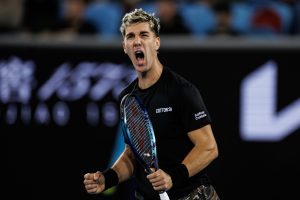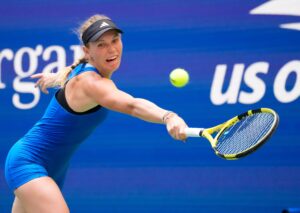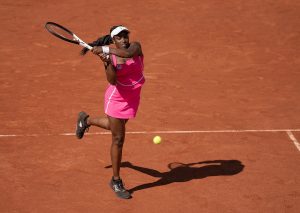It seems churlish for a British tennis fan to criticise Johanna Konta for her limp and ultimately limping end to 2017, a year in which she has risen as high as No. 4 in the world and reached her first semi-final at Wimbledon, her home Grand Slam, in the process elevating herself into the nation’s sporting consciousness. However, if she is to continue the staggering rise that she has made in the last two seasons, the challenge for her in 2018 is to perform all year round, not only so she can finally reach the WTA Tour Finals at the end of the season but – far more importantly – so she can go even further in a Grand Slam, making the final and perhaps even winning it.
The fact that we can even consider Konta as a genuine Grand Slam contender is the ultimate testament to her development in the last two years. It all began, of course, at the 2016 Australian Open, when she seemed to come from nowhere (or about 150 in the world rankings) to reach her first ever semi-final at a Major. Although she lost that match in straight sets to the eventual tournament winner, Angelique Kerber, she had nevertheless finally proved what many astute tennis observers had long maintained, namely that she had the game to challenge even the very best women. All she lacked, it was said, was the mental strength to remain in matches, especially tough ones, and to remain consistent from tournament to tournament.
Konta herself credited the overdue acquisition of that mental strength (a much-overused term in sport that often simply means “constant concentration”) to her work with the mental coach, a Spaniard called Juan Coto. At the start of 2016, she certainly seemed to have adopted an entirely new attitude, in particular exhibiting what is perhaps the most priceless ability of any tennis player – the ability to forget the shot you have just played in order to focus on the next one, or what might be called “instant amnesia”. Consequently, although she could not replicate her form in Australia at the start of 2016 in the other Majors last year, she continued to move steadily, and at times spectacularly, up the world rankings. She cracked the top 10 and almost made the top eight, which would have taken her to the end-of-season WTA Tour Finals in Singapore. Unfortunately, at the last she faltered, losing out on the final place in Singapore to a resurgent Svetlana Kuznetsova. Nevertheless, by any standard she had had a truly remarkable season.
It was what happened near the end of 2016 – on 12 November 2016, to be precise – that made her performances throughout 2017 even more impressive than those in the preceding year. On that day, Coto, the mental coach who had done so much to help her, died. Then, as if that wasn’t bad enough, in the spring of 2017 the inquest into his death concluded that he had committed suicide. This verdict was shocking to most of his family and friends, including Konta, and it may have been a factor in her on-court emotional breakdown during Britain’s Fed Cup match with Romania, when she began weeping in response to the apalling off-court goading and name-calling of the Romanian captain, Ilie Nastase.
In the great Woody Allen film, Crimes and Misdemeanours (1989), Allen himself plays a film-maker who is making a documentary on a Jewish university professor and philosopher, Louis Levy, who had survived the Holocaust and continued, to the amazement of Allen’s character, to preach a philosophy of optimism and endurance. As a result, Allen’s character is absolutely amazed and completely devastated when, apparently out of the blue, Levy kills himself, leaving a ridiculously short suicide note: “I’ve gone out of the window”. Allen’s character finds it almost impossible to believe that such a life-affirming individual should end up taking their own life, and the same must have been true, at least to some extent, for Konta when she learned what had happened to Coto. Consequently, her continued improvement throughout 2017, in which she built upon and even exceeded her achievements of 2016, was one of the most impressive achievements by any sportsman or woman this year.
It all culminated, of course, in Konta’s run to the last four at Wimbledon, during which she made British tennis fans believe what they had thought impossible just a few years earlier, namely that Britain might produce a female Grand Slam champion to go alongside its existing male champion, Andy Murray. If, ultimately, that proved beyond Konta, as she lost in the semi-final to Venus Williams, she had none the less proved that the 2016 Australian Open was not a fluke and that she was a genuine Grand Slam contender.
That is what has made the second half of Konta’s season so disappointing. Perhaps it was inevitable that the incredible, indeed vertiginous, rise that she has made in the last two years, not to mention the emotional effects of dealing with Coto’s death, finally caught up with her, like a diver who comes to the surface too quickly and contracts the famed and deadly “bends”. More prosaically, she has suffered from injury problems, including the current injury to her left foot which has prevented her from competing in the Kremlin Cup in Moscow and thus ruled her out of winning an automatic place at the WTA Tour Finals.
Whatever the reason, though, it has been an undeniably frustrating and disappointing end to the season for Konta, culminating in five first-round defeats that have seen her slide gently down the world rankings and out of the automatic top eight places for the WTA Tour Finals. Although she may yet travel to Singapore as “first alternate” and could even play at the event if one of the women ranked above her is injured (and as both Elina Svitolina and Caroline Wozniacki have withdrawn from tournaments this week, that is a real possibility), it will not completely disguise the fact that she has, for the second year in a row, finished the season on a low.
Like so many of the top male and female players who are currently injured, Konta will use the (ridiculously brief) tennis off-season to try to rebuild her fitness and with it her form. In her specific case, the challenge will be to try to build up the long-term core fitness, and with it the long-term consistency of play, to ensure that, unlike the last two years, 2018 does not end with a whimper but a bang. That will be difficult, as it will be for all the women on the WTA Tour when Serena Williams returns after giving birth to make her final onslaught on Margaret Court’s all-time record of 24 Grand Slam singles titles. However, given everything that Konta has already achieved – somehow dragging herself up the world rankings and then surviving the suicide of the mental coach and mentor who had set her on that course – it is certainly not beyond her.
Main Photo:






